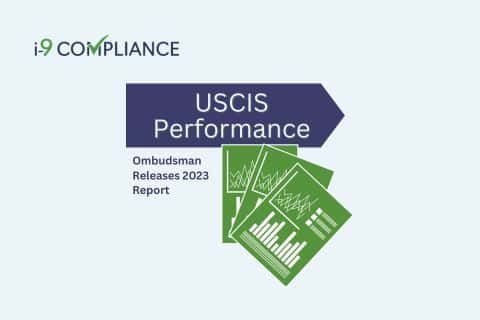Ombudsman Releases 2023 Report on USCIS Performance

July 21, 2023
The Office of the Citizenship and Immigration Services Ombudsman has published its annual report to Congress. This report concerns the U.S. Citizenship and Immigration Services (USCIS). This annual report thoroughly investigates the agency’s performance and activities. It also provides recommendations for performance and a thorough analysis of how the agency performed over the last year.
Much of the report focused on the agency’s long backlog struggle and excessive processing times. After examining the current state of the backlogs, the report made several recommendations for improvements. Some suggestions could improve the customer base’s experience too.
The report deeply analyzed the USCIS’s historical and current processing times and visa backlog. In 2022, the USCIS began the year with significant backlogs related to the “downstream impacts” of the COVID-19 pandemic. These impacts led to an immense backlog of cases that required attention.
Furthermore, the report revealed that the agency had an additional incentive to tackle these cases. Due to pandemic-related shortfalls and overages, the agency had reason to use the additional employment-based immigrant visas made available.
As a result, the agency prioritized employment-based immigrant visa adjustments and naturalization applications. This prioritization of employment-based visas and naturalization reduced processing times and backlogs for these petitions. For example, processing times for the Application for Employment Authorization (Form I-765): Based on a pending I485 adjustment application, times dropped from 7.1 months in 2021 to 5.7 months at the end of December 2022.
However, this focus adversely impacted processing times and backlogs for other types of applications. For example, there was very little progress in reducing the processing times for forms such as I-751 or I-601A, which stood at 19.5 months and 34.3 months, respectively.
The report provides several suggestions for reducing these backlogs and improving customer service. These include:
- Increasing the use of technological solutions to improve efficiency;
- Increasing staffing levels to allow the USCIS to review applications more quickly and work through existing backlogs;
- Expanding efforts to improve the adjustment of the status process and better coordinate humanitarian parole applications;
- Improving the Temporary Protected Status (TPS) process by eliminating separate Employment Authorization Documents for TPS applicants and considering pursuing legislation to extend periods of TPS designation.
The ombudsman’s report contains many more facts and recommendations regarding the USCIS. However, these are among the most significant. In addition, employers can enhance their onboarding concerning employment eligibility verification (Form I-9). Employers can improve their processes by integrating an electronic I-9 management tool. This tool can boost efficiency and remove one of the most significant burdens on HR personnel during hiring.
When it comes to your work, automation makes eligibility verification quick and seamless. Get a head start today with I-9 Compliance.